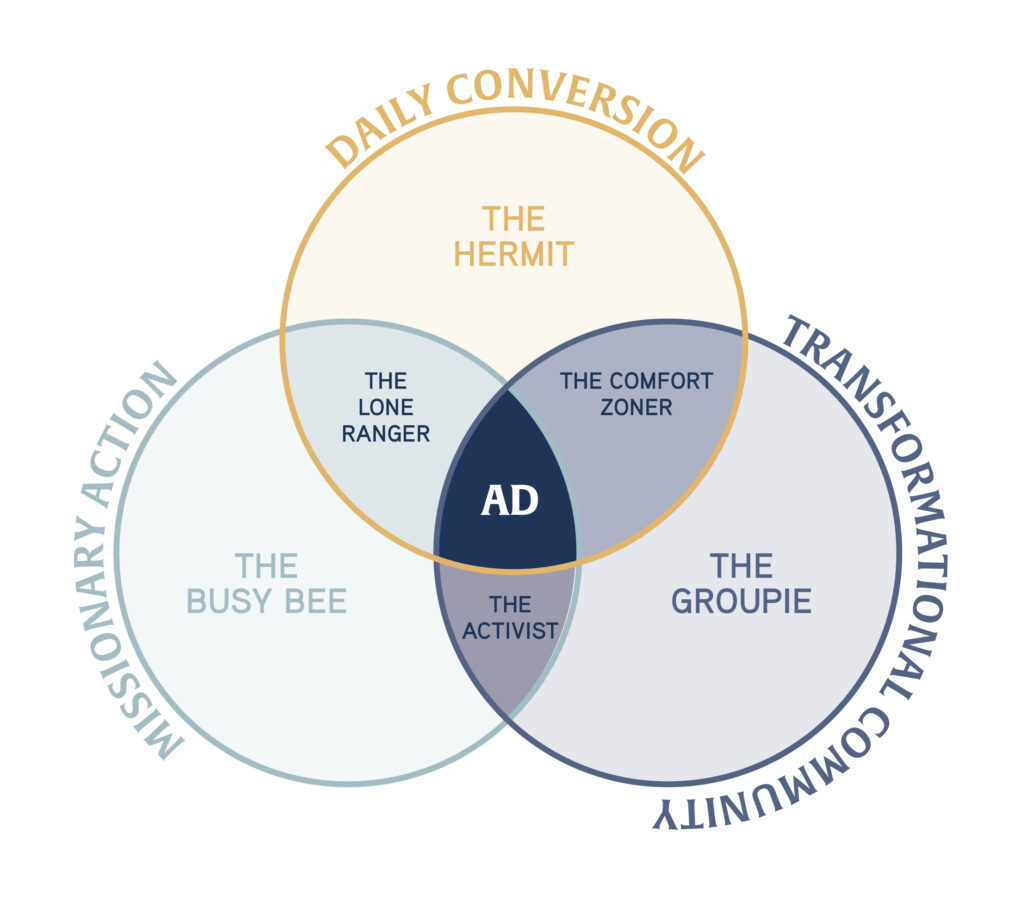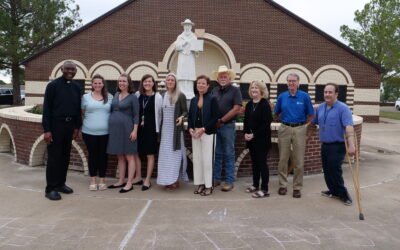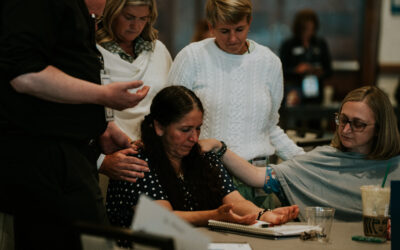Discipleship can be one of those words that is difficult to define. Many people in the Church today are talking about discipleship, but few people can tell you exactly what it means.
At Amazing Parish, we believe that active discipleship is rooted in three essential elements: Daily Conversion, Missionary Action, Transformational Community, . For a parish to be passionately forming disciples, the leaders of the parish must first be practicing these critical behaviors.
These aren’t steps to follow in sequence. Instead, they function like a three-stranded cord. Alone they have value, but together they form a structure that can carry the weight of the mission. First, let’s talk about what these mean and then we’ll talk about what they mean for you in your leadership.

Daily Conversion
The first pillar of active discipleship is to live a life of constant conversion. A daily examination of our walk with Jesus and invitation to deeper conversion is essential – no matter where you are on your faith journey. This means that a disciple has made a decision to surrender their life to Jesus and that they renew that commitment each day.
In the Gospel of John, written decades after his first meeting with Chist, the apostle remembers the time of day when Jesus called him, “it was about the tenth hour”. Our initial conversion, and the graces from it, should be just as central in our lives. If we have not given our lives fully to Jesus, we cannot effectively lead others to a deep and authentic experience of faith.
Our initial conversion should lead us to ongoing conversion. Each day, a disciple must wake up and continue to give his or her life to Christ. Each day, a disciple must continue to root out sin and vice, and decide to grow in imitation of Jesus so they can more confidently bring Jesus to the world through our witness. As Pope St. John Paul II reminded us, “The witness of a Christian life is the first and irreplaceable form of mission” (Redemptoris Missio 42).
Missionary Action
If the first pillar of active discipleship is about imitating Jesus’ intimacy with the Father by growing in holiness, the next pillar is about uniting ourselves with Jesus’ mission to the world. We have each been called to become missionaries – regardless of our position in the parish.
Jesus doesn’t call without also sending. In John 4 we read the story of the Woman at the well, who meets Jesus, recognizes him as the Messiah, and then immediately goes on to share this good news with everyone in her town. She didn’t need years of training, she didn’t need to have all her baggage worked out (and she had plenty of it). She needed a radical yes to follow Jesus and the next part of her mission flowed naturally.
A real encounter with Jesus lights a fire in us. Suddenly, it matters deeply that others know Him and experience Him too. We want them to experience the same mercy, the same love that’s transformed us. And while we may not have the strategy or skills perfectly figured out, that can’t be an excuse. The time to start sharing Jesus is now. Our conviction about who Jesus is must lead us to have courage in sharing him with others – in both word and deed.
The Church has named this point of emphasis very clearly in Evangelii Nuntiandi 24, “Finally, the person who has been evangelized goes on to evangelize others. Here lies the test of truth, the touchstone of evangelization: it is unthinkable that a person should accept the Word and give himself to the kingdom without becoming a person who bears witness to it and proclaims it in his turn.”
Transformational Community
Discipleship was never meant to be a solo journey.
In the Gospels, Jesus sends His followers out two by two—not just for practical reasons, but to model a truth at the heart of the Christian life: discipleship is relational. Our discipleship meant to not only transform us as individuals, but to transform the world around us.
St. Paul gives us the model in 1 Thessalonians. 2:8: “So, being affectionately desirous of you, we were ready to share with you not only the gospel of God but also our own selves, because you had become very dear to us.”
St. Paul wasn’t just preaching; he was pouring out his life. This is the heart of transformational community—where the Gospel and genuine relationship are inseparable.
We’re called to share the Gospel and share life. Oftentimes in our parish communities, these get out of balance. We share only the Gospel through our parish programs, or we share only life through social events. It is only when there is a deep integration of these two areas that we are living active discipleship. It is only when we truly invest in relationships of depth and substance that a true community of disciples is present.
Relationships like this break down the facades that often dominate parish life.
- They disrupt the anonymity of the individual who comes and goes each Sunday without being known by anyone.
- They uncover the hidden pain of the family who seems to have it all together in the front pew but is quietly struggling.
- They meet the isolated seeker—someone praying sincerely but lacking the community to help her grow as a disciple.
- They offer encouragement and sustenance to those disciples already seeking to share their faith with others
All of this is redeemed when real transformational relationships take root – relationships of healthy vulnerability and accountability.
We need to intentionally create spaces and relationships where we can be honest about both the struggles and joys of living out our Christian mission in the world. A mission that is meant to transform not only us, but also the parish community we live in and the neighborhoods where we serve. This is our mission. And it’s in this honest sharing that others—who know us, love us, and walk with us—can challenge us, support us, and help us to live a life of holiness and mission.
What does all this mean for your parish leadership today?
This is all well and good but what does it mean for a parish leader who is working to infuse this culture into the leaders of the parish as a whole? How do you develop this culture when some of your leaders are lukewarm but are deeply engrained in the community, others may not be Catholic or Chirstian, and most aren’t accustomed to this way of life?
The cultural shift can be a tough one and often takes some time to fully develop. However, there are some very simple practical things that you can start doing with those around you to develop a culture of active discipleship.
A simple tool we have seen bear a lot of fruit across hundreds of parishes is called the Three Conversations. These simple prompts for discussion among staff, councils, and friends create an environment of unity and honest sharing. Below, we’ve put together a simple guide for you to gather a group of leaders in your parish for these conversations. It’s not a program to follow – it’s an intentional step into a culture where sharing life and sharing mission are part of the air we breathe.
Another tool for you to use is our new Active Discipleship Examination. This tool helps us reflect on the dangers we encounter when we fail to live each of these three pillars in harmony. Use the tool to reflect on where you have room to grow and make an action plan to strengthen the areas you may struggle in.
Go, Therefore
We believe that when a parish fully commits to helping its leaders and members live out these three essential elements of active discipleship, it lays the groundwork for lasting fruitfulness in apostolic mission. Your parish can become more than a hub of activity and busyness on the parish property, but a center of fruitful mission in your community.





0 Comments